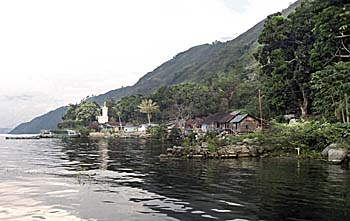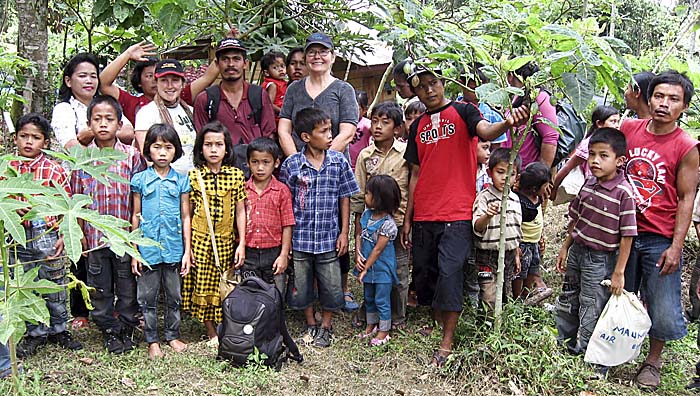Once upon a time there was...
...an ecovillage in Silimalombu. After the last contact with Ratnauli it came out that the ecovillage declined into an ordinary business for solar panels.
Therefore this page is outdated and gives an idea of the ecoproject as it was in the past. For more information you better contact them directly.
August 8th, 2014
1.
Ecovillage Silimalombu
In 2009 and 2010 I spent a total of five month on Sumatra, most of the time on Samosir Island. There I got to know Janneke, a mid-twenty volunteer from the Netherlands, involved in the Ecoproject Silimalombu. She invited me to have a look there and I followed the invitation.

Silimalombu. Image by Asienreisender, 2010
Arriving in Silimalombu, a hamlet at the very end of a small coastal road, situated in a picturesque landscape at the bank of majestic Lake Toba, I was warmely welcomed by Ms. Ratnauli Gultom, the daughter of a local Raja, whose heritage after his death was a widestreched piece of land along the lake's shore. Ratnauli, or 'Ratna', as everybody calls here here, is the heart and the soul of the local Ecoproject. She has plenty of ideas and visions for the future and spends all her energy in fullfilling them.
The project consists of several subprojects. These are:
1. Waste reduction and waste disposal. For there is no awareness in the mind of the local population concerning pollution, there is plenty of (especially plastic waste) spread around. To remove that and to teach the people a better way to deal with it is one target. Additionally, Ratna is in connection with the local governement to find a common solution for the problem, because the local people are forsaken when collecting their rubbish but having no garbage removal system to move the litter away. The only waste disposal site on the island I personally observed, is of a kind as it would be called a 'wild one' in western countries. Plenty of rubbish heaped up at a roadside outside Pangururan, and merely burnt there respectively left without further treatment.
Another serious concern is the water quality of Lake Toba itself. Since around 2003 or 2004 there is an 'aquafarm' operating on the lake. They 'produce' fish, tilapia, in great amounts. For that purpose they use plenty of antibiotics, other medicals and fishfood in abundance, partially rotting later on the lakeground. It's said, that the aquafarm produces a 100 tons of fish daily [!]. The mass production and the fish's faeces do a great harm to the water quality. The destination of the 'produced' fish are better restaurants abroad, mostly in western countries. On aquafarm's website the company's operations are described as 'environmental friendly'. That's a very flexible expression, often used euphemistically by companies who cause pollution and need a 'greenwashing'. However, they provide, as I heard, a 1.000 jobs in the local economy, and that makes them politically untouchable. Unpopular among the local people, the aquafarm is a mighty opponent for everybody who want's to save the environment of Lake Toba.
2. Education of the local children. The volunteer Janneke did a really great job in edutaining the children about environmental problems, health, hygiene and teaching them English. At a later time I met there also Helen, an Australian volunteer, who thaught the kids similar topics. Now Ratna is teaching, and for the children it's a real benefit and great advantage. Especially since it's done in long term. All they did and do they do it as volunteers, means without beeing paid for their efforts.

A group of children from Silimalombu on a trip to Taman Eden ('Garden Eden'), a kind of alternative agricultural project on Sumatra mainland. Most of these kids have never been on the mainland, never left Samosir Island, presumably seldom have been out of Silimalombu.
Image by Asienreisender, 2010
3. Reforestation. In the 1980's and 1990's a big logging company cut down the major part of Samosir Islands natural forests to feed a local paper factory. A harsh loss for the ecological system, and a change for the natural groundwater system. Deforestation also means a higher risk of earthslides in rainy season. To at least partially compensate this destruction of nature, Ratna's ambition is to plant a great number of trees on her ground, and she already planted a lot. It's a still ongoing process.
For all that, Ratna and the Ecoproject in Silimalombu need assistance. Who want's to come and has some spare time to do so, can assist in the project for a few days, weeks or longer. Accommodation and food are for free, it's all simple but nice in a friendly family who appreciates foreign visitors. If one wants to be part in the project for longer, ask Ratna about a Social Budaya Visa; maybe it's possible to stay then for a couple of months. I especially enjoyed my visits there very much among friendly, relaxed and unneurotic people and amidst a stunning mountain-lake scenery which is among the most beautiful I have seen in the world.
Visit their blog here: ecovillagesamosir.blogspot.com (outdated).

The shores of Lake Toba between Tomok and Silimalombu. Image by Asienreisender, 2010